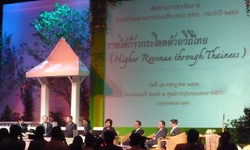TAT devises “DISCO Plan” to implement Tourism Action Strategies for 2013

Bangkok– The Tourism Authority of Thailand (TAT) has divided its action plan into five implementation categories under the acronym, “DISCO Plan.” The five categories include: Digital marketing, Image-building, Sustainable Development, Crystallization/Crisis Management, and Organization Management.
According to TAT Governor Suraphon Svetasreni, these five categories clearly identify how the TAT will work with all its partners and stakeholders, both within Thailand and abroad, as well as upgrade the quality of its internal personnel skills to deliver on the tourism targets.
Said the Governor, “The strategic direction for TAT action in 2013 has been formulated entirely with the co-operation of all parties involved in the tourism industry, and its implementation will also need the same level of co-operation.
“We began with brainstorming sessions in our ‘Marketing Think Tank 2013’ meetings in March 2012 and worked extensively with the private sector through focus groups. All our TAT offices abroad also consulted our foreign partners. It can be said that this year, everybody is involved in determining the marketing direction of Thailand’s tourism industry.”
Mr Suraphon added that, these days, the best-laid plans can be quickly disrupted by unexpected developments, which means that the industry has to be ready to change at any time.
“The context of the changing world around us is a constant challenge that never stops and keeps changing all the time. It is something we have to recognize and be prepared to face. We have to work together to create new opportunities,” he said.
The five implementation categories have been categorised as follows:
DIGITAL MARKETING: This is the “new media” of the 21st century, increasingly in use by young people but slowly cutting across all demographics. Its use is growing as countries upgrade their technological capabilities to bridge the digital divide. The TAT moved into the digital era several years ago and gained extensive expertise in the art of using powerful imagery and messages to convince target customers to visit Thailand. This will be continued in future.
IMAGE BUILDING: Thailand has always had a good image among the travelling public worldwide. However, maintaining this image remains an ongoing challenge, especially in view of strong competition from both emerging and established destinations worldwide. The emergence of quality lifestyle products such as health & wellness, weddings and honeymoon, golf, marine tourism, and so on goes a long way towards strengthening this image and will remain a primary focus of marketing efforts.
SUSTAINABILITY: The impact of global warming and climate change means that travellers of all kinds are more conscious of their ecological impact. As a result, the pursuit of economic gains from tourism must be balanced with efforts to offset ecological and environmental impact. This means continuing to reward good practises among the private sector and helping destinations and companies upgrade their sustainability efforts.
CRYSTALLIZATION & CRISIS MANAGEMENT: In a fast-changing and increasingly unstable world, the ability to spot emerging trends and react to unforeseen developments lies at the heart of decision-making. Thailand has gained extensive experience in this area, as witnessed by the response to the 2011 flooding crisis. Special units have been set up within the TAT such as a Tourism Intelligence Unit and a Crisis Management Centre.
ORGANIZATION MANAGEMENT: This is the heart of the implementation process. All marketing plans need to be professionally executed and evaluated. The TAT will continue to upgrade the delivery skills of its staff in order to ensure better bang for the buck and meeting Key Performance Indicators.
According to Mr Suraphon, “The changing nature of the tourism industry makes it impossible for any marketing agency to operate in isolation. We are fortunate to have a very marketable product and supportive partners, both in the public and private sectors, in Thailand and abroad.“With their help and advice, I am sure we will be able to pull off a successful 2012 and 2013.”-TAT
















